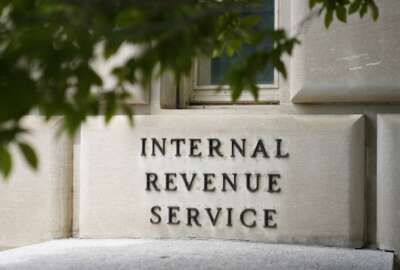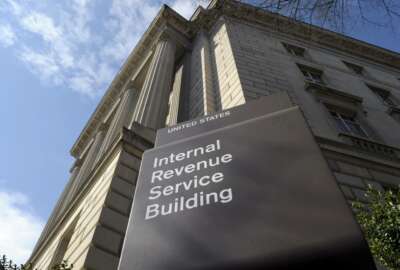February unfolds as IRS enters into its annual pressure testing
The IRS has made measurable progress on customer-service staffing over the last couple of years.
The IRS has made measurable progress on customer-service staffing over the last couple of years. If it was a hospital patient, it might be out of the intensive care unit, but still in the hospital. For a review of the IRS’ top challenges as it hits the 2024 filing season, the Federal Drive with Tom Temin talks with Taxpayer Advocate Erin Collins.
Interview Transcript:
Tom Temin Well, let’s get right to it. You have issued your annual report to Congress in outlining the problems. And even though a lot of the processing and customer service issues have been mitigated, they’re not zeroed out, are they?
Erin Collins No. I think you can say that we are at pre-pandemic levels, and the challenge is that’s great because the last three years have been incredibly difficult for taxpayers, practitioners, IRS employees, IRS. But the challenge is pre-pandemic levels were not great for taxpayers. So I think we’re back to where we started and now we need to improve.
Tom Temin And you have pointed out in your top set of problems is processing. And were you mainly talking about paper processing, which even though it’s a small percentage, still kind of bedevils the agency or do they have electronic issues also?
Erin Collins Yeah. So this year, for the returns that were filed in 2023, both the electronic and paper original returns seem to go through without any real hitches, as long as there weren’t errors or problems with the return. So those payments were being made timely. The challenge the IRS had was amended returns and correspondence, those spiked during 2023. And so by year end, they had an excess of two plus million amended returns and various correspondence. And identity theft was also a big issue that occurred in 2023 with respect to overaged inventory or backlog.
Tom Temin Yeah, so the amended returns then piled up on them. And many of those were left in piles, so to speak.
Erin Collins Yeah. The challenge with the amended returns is a lot of people are not aware that the customer service representatives, those are the folks. When you call the 800 number to speak with the IRS, they wear multiple hats, they answer the phone, they help taxpayers, but they also sort of on their downtime process of paper, whether that be amended returns or correspondence. And the challenge the IRS had in order to reach a higher level of service in 2023, they did not process paper. So they answered more calls at the expense of creating a paper backlog.
Tom Temin And is there an issue with processing paper in a telework setting? Can you take it home with you?
Erin Collins Unfortunately, no. The folks at work paper itself, there physically in the campuses in the building. But a lot of the returns are electronic. And so therefore people can work those from other locations.
Tom Temin Yeah. So they have a telework policy in place and people that are going on a case by case or file by file basis, they don’t need to be in the IRS office if it’s all online. That’s correct. And where are they, by the way, with respect to telework at this point?
Erin Collins It depends on the position tense of the person. For example, new employees, they are required to be in the office. But if you’re more seasoned you can have an agreement where again depending on the position, but you might be able to do a situation where you work two days per pay period in the office and then you can work remotely on the other days. And there are some positions within the IRS that you actually could work full time remote.
Tom Temin All right. And then that gets to the staffing issue. And you’re saying that even though they’ve had a lot of hiring since some of the money came through the Inflation Reduction Act, are they where they should be at staffing? Because you pointed out that’s still a challenge.
Erin Collins Yeah, it’s a challenge. If you look at the numbers, IRS has done a fair amount of hiring, but a lot of that’s been internal, which is great because people get promoted, those are good for the internal folks. But external, we just haven’t brought enough people in. We have had an increase the last two years. It’s been in the single digits. When you look at the net number for those who left versus those coming in. So they’re making small progress, but they really need to focus on getting the right people in. Public service, there are a lot of people that’s a passion for them, but not everyone wants to come in and be a public servant. So it really is, how do we entice these folks to see that giving back and working for your community is a good thing, and that’s a challenge the IRS has.
Tom Temin But you also pointed out that they need the capacity to do the ingestion. The finding, the hiring of people in the human capital office itself is not fully staffed.
Erin Collins Correct. And that is a challenge because even the ones that individuals come in that are interested in a job, the time from they make their first inquiry through the application for when they actually start is too long. It’s too long of a process. And especially if you look at folks that are on the lower end of the salary spectrum, they can match that elsewhere. So they’re not going to sit around and wait three, four or five months in order to get the position. A higher skilled individual may be coming in for a purpose. They may be more interested. But again, the large percentage of IRS folks, they want a job, they want a salary, they want to get back, but they’re not going to wait.
Tom Temin Sure. And then there is the issue of special authorities. For example, Veterans Affairs had all kinds of special authorities to hire people more rapidly. The IRS has some of those, I think you’ve found that they don’t really use those tools very well.
Erin Collins Well, they have them. And to the extent that they apply for particular jobs, they’ll go out, what they would refer to as a jobs fair, and they have the ability to hire people on the spot. But the challenge, again, is they still have to go through all the security checks, everything from background to fingerprinting. And so even though the offer comes in a lot quicker, they still have all the back end processing that has to take place before they can start.
Tom Temin We’re speaking with Erin Collins. She’s the national taxpayer advocate at the IRS. And before we get to some of the other issues, do you get the sense that the leadership under Danny Werfel is alert to these things and is kind of approaching them with a sense of urgency?
Erin Collins Yeah, I think the additional funds really are both transformational and incentivized people, because for the first time in over a decade, they’re really looking at the future rather than just trying to put out fires every day. So we still have a few fires that they’re working on, but they really are looking forward as to how do we do things better, how do we improve service? How do we be transformational is a term that we use in the building on a daily basis.
Tom Temin Sure. And one of those areas is customer service. And we know the disaster of 20, 21, 22 when you couldn’t get the phone answered, etc.. They’ve come quite a ways back. But you also found some issues with the way they measure that metric, that maybe it’s not quite as good as it seems.
Erin Collins Well, we have a difference of opinion on how you determine level of service. But my real challenge is I think it’s a horrible measure, period. Regardless, if you apply our methodology or the IRS methodology. You really need to look at the question of if you’re calling, how long are you on hold? Do you get your question answered? Are they able to move whatever your issue is forward? I don’t think the IRS should be focusing on how long, how many people are on the calls, whether it’s a hang up or not hang up, or whether or not you go to a chat bot. Let’s look at the quality. And the quality is judged by the taxpayers what their needs are.
Tom Temin And I want to switch to the information technology modernization, which has been going on now for two generations basically. And maybe we should just say, let’s stop calling it modernizing, but call it a continuous process of keeping up to date, because that’s what they really been doing. Even though there’s a formal program, tax systems modernization, it’s still a challenge.
Erin Collins It is a challenge. When you think about the amount of the volume of what the IRS has. Individual tax returns are in excess of 160 million a year. Then you have business returns of approximately, let’s say, 20 million a year, and then you have hundreds of millions of information forms, other types of things. It is a heavy lift, and they have that information going back to the dawn of time in essence. So their systems, it’s not like you can just quickly turn on a dime. They have a lot of information, a lot of material that they need to work with. So that is a challenge for the IRS. So I’d like to go back and use the word modernization. They need to modernize and just not just do quick fixes throughout the year.
Tom Temin Because they’re on they’re about fifth or sixth, maybe seventh attempt at modernizing the assembly language master file system. And they’ve tried that since the 90s. And the projects always sort of fall apart. Do you think they’ll get it done this time around?
Erin Collins It’s on the short list. And so for the individual master file, I believe they’re looking at the next couple of years that they will be able to transform the IMF program. And after that they got to work on the business modernization.
Tom Temin Of course, they could always just train 100 people to use assembly, and they would never have to modernize it, and it’ll keep them around for the next 25 years.
Erin Collins It’s probably not the most efficient way to do it, but yes, they could do that.
Tom Temin Like training steam engine operators, I guess. And finally, you have a long list of legislative recommendations. Let’s just maybe discuss the top three, other than changing the tax code to five lines.
Erin Collins Right. I think a lot of people would like to have the tax code change, but I don’t think we’re going to get that across the finish line. So some of the things that we focus on, and if you’re looking for the sort of the greatest impact to taxpayers, I would put requesting Congress or requiring Congress to initiate legislation for non credential prepares. When you look at the percentage of returns that are filed by preparers, it’s about 50%. And of those a very high percentage of are non credentialed. So when you think about it, you go to a beautician they have a license. You go to a doctor, they have a license. Basically, what you do every day someone has to have license education, other types of requirements. So these are people handling your financial transactions. And I think it’s very important. The other challenge what we’re seeing is and we did as part of a study looked at the earned income tax credit. And it’s a very high percentage of error rate or prepared by non credentialed individuals. So again they’re harming taxpayers or harming tax administration. And we really need to get that enacted, and I think that to me would make a huge difference, especially for the lower income folks that tend to rely on non credential individuals. One of the other areas that I’d like to see that would be taxpayer favorable is the Tax Court. The United States Tax Court tends to hear cases that taxes are due. When Congress originally set up the system, refunds went to the district court and the claims court deficiency or tax due went to the Tax Court. Tax court specifically has judges that do nothing but taxes. We’d like to see the court have their jurisdiction expanded to include not only tax do, but refund situations. When you look at the docketed cases in the tax court. 91%, that’s a big number, 91% represent themselves. And so we’d like to see the same situation for refund cases. A lot of individuals may not have the financial means to go into district court or claims court. In my opinion, in my experience, I would not suggest anyone go into those courts without representation.
Tom Temin But the representation could be more than the refund.
Erin Collins Exactly. And a lot of these refunds are smaller dollars. So if you have a $5,000 refund, you’re not going to pay an attorney in order to go into district court or claims court. So give those people an opportunity to have the tax court hear those issues. So those are two of the ones that I would really like Congress to focus on.
Tom Temin And do you get a good ear when you send your report up and when you talk to lawmakers?
Erin Collins We have interest. I just think it’s difficult sometimes to get legislation passed. And so we are going to continue working on that with the members of Congress. We have over 60, I think it’s 65 or 66 recommendations this year, and a lot of them are just simple fixes, and others are more transformational, such as giving tax court refund jurisdiction. That’s a little bit more of a policy decision, but some of them are just clean fixes that we can make to improve the experience for taxpayers and improve tax administration.
Tom Temin Sounds like we could use an omnibus bill for the IRS.
Erin Collins That would be a great idea.
Copyright © 2024 Federal News Network. All rights reserved. This website is not intended for users located within the European Economic Area.
Tom Temin is host of the Federal Drive and has been providing insight on federal technology and management issues for more than 30 years.
Follow @tteminWFED






